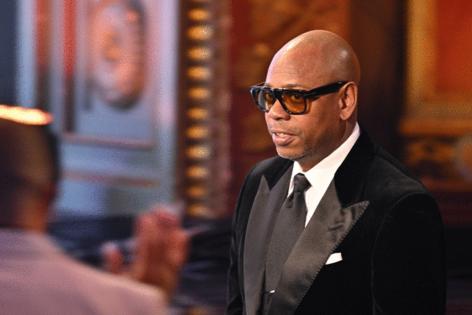Commentary: Will anti-woke comedy recover from the Riyadh Festival?
Published in Entertainment News
Any event that includes comedy’s biggest names is going to attract attention — but the Riyadh Comedy Festival, which kicked off on Sept. 26 and continued through Thursday, is disproving the adage that there’s no such thing as bad publicity.
Organized by the Saudi government, the festival is widely viewed as an effort to whitewash the kingdom’s human rights abuses.
The fallout extends beyond Riyadh, though. American comedians who built their brands railing against censorship and are now performing for one of the world’s most repressive regimes look like hypocrites. They might believe this PR scandal will eventually blow over — and maybe they’re right. But the damage it causes might prove far more lasting. This event could very well end the era of the self-proclaimed, free speech-defending, “anti-woke” comedian because many of the big names in that sphere were prominently featured on the bill.
Chief among them is Dave Chappelle. He has faced years of backlash for transphobic jokes and routines in his Netflix specials but has been adamant about his right to tell them. There’s also Andrew Schultz, who has argued that if “we set a precedent that we silence comedians when people are offended, there will be no comedy at all,” and Jeffrey Ross, who once surmised that maybe his friend Norm Macdonald didn’t want to live in a world where “everyone’s trying to cancel everybody.” And we can’t forget Whitney Cummings. She has described herself as a comedy “martyr,” one of those willing to “sacrifice themselves just to make sure the First Amendment is still intact.”
Surprisingly, they had no objection to performing for a government that has been accused of involvement in the Sept. 11 attacks — allegations Saudi Arabia has denied. More relevant to the comedians’ cause, the government has also been accused of killing journalists Jamal Khashoggi and Turki al-Jasser for their criticism of the kingdom.
Despite the glaring contradiction, participants have mostly justified their decision by pointing to the big payday attached to the festival — reportedly in the six-to-seven figure range. Pete Davidson, whose father was killed on Sept. 11, may have summed it up best: “I just know I get the routing, and then I see the number, and I go, ‘I’ll go.’”
But — as these comedians should be the first to know — more than a paycheck was at stake in Riyadh. In their line of work, free speech isn’t just a catchy buzzword or even a lofty ideal. It’s a necessity in a healthy democratic society, even when the consequences can be personally or professionally damaging. There is a long, storied history of comedians fighting to protect their words, and those of their colleagues and successors, even when (or especially when) their material was provocative and anti-institutional.
This is not the kind of polite-society backlash that these comedy martyrs have spent the past few years railing against; we’re not talking about being called out or canceled on social media. Lenny Bruce was arrested for using profanity and satirizing the Catholic church onstage. George Carlin went to the Supreme Court to defend his right to say every word he wants (including the seven you can’t say on television). Richard Pryor took on network censors and cut short a lucrative NBC variety show. And these are not merely historical footnotes: Stephen Colbert, who routinely criticized President Donald Trump, will be out of a job next year, and Jimmy Kimmel was nearly forced to follow him out the door.
Criticism of Riyadh’s performers from within the comedy community has been swift and unsurprisingly pointed. But so far, Jessica Kirson is the only performer who has publicly expressed regret for her participation, while others have responded to the backlash by doubling down.
Chappelle had the nerve to say, on stage, “It’s easier to talk here than it is in America.” One could ask him to back that up with a tight five minutes on Khashoggi. Bill Burr, in an odd word choice, said his Riyadh show “murdered,” while acknowledging that “You can talk about anything — other than a couple of things, which is basically religion and don’t make fun of the royals.” Louis C.K. echoed this point. He called the festival a “good opportunity,” but admitted that he too was told not to joke about two things — “their religion and their government.”
Well then, that’s not free speech. That’s conditional speech, which is exactly the sort of thing many of the participating comedians have repeatedly decried in their stand-up acts and public statements.
“The more you say I can’t say something, the more urgent it is for me to say it,” Chappelle said in 2022, amidst backlash for his transphobic jokes. “And it has nothing to do with what you’re saying I can’t say. It has everything to do with my right, my freedom, of artistic expression. That is valuable to me. That is not severed from me. It’s worth protecting for me, and it’s worth protecting for everyone else who endeavors in our noble, noble professions.”
Performing at the Riyadh Comedy Festival does the opposite. Pretending otherwise demands rhetorical gymnastics. And watching comedians who’ve spent years patting themselves on the back for “speaking truth to power” twist into pretzels to justify a Saudi payday may be the only funny thing about this situation.
———
This column reflects the personal views of the author and does not necessarily reflect the opinion of the editorial board or Bloomberg LP and its owners.
Jason Bailey is a film critic and historian. He is the author, most recently, of "Gandolfini: Jim, Tony, and the Life of a Legend."
©2025 Bloomberg L.P. Visit bloomberg.com/opinion. Distributed by Tribune Content Agency, LLC.













Comments